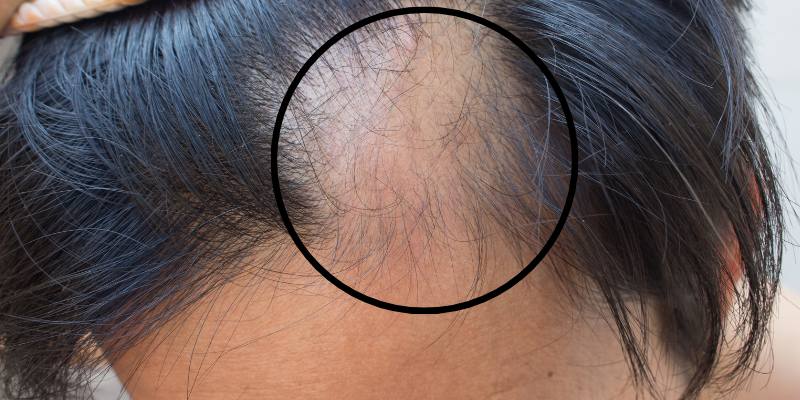Did you know that your medical insurance may pay for the cost of your wig?
It is true, yet there are requirements that must be fulfilled.
We'll go over the requirements in this blog and lead you through the process of obtaining medical wig insurance coverage.
You will gain more knowledge about cranial prosthesis, insurance companies that provide coverage, how to get reimbursed by your insurer, and what to do if it refuses to pay you back for wigs.
Will Insurance Pay For A Wig?
If you have medical hair loss, you may be compensated for a partial or complete cranial prosthesis.
However, keep in mind that your insurance plan determines your coverage. Typically, insurance companies will pay 80–100% of the cost of your medical wig.
Additionally, you will receive one hair prosthesis annually for medical hair loss unless your insurance company specifies otherwise.

Kinds of Hair Loss That Insurance Covers
- Hair Loss from Chemotherapy Related to the Kidney
- Hair Loss Resulting from Cancer
- Alopecia
- Hair Loss Associated with Radiation or Chemotherapy
- Hair Loss as a result of thyroid issues
- Thinning and/or Balding, Genetics, Stress, Ageing, and Reaction to Medical Illness are some of the causes of medical hair loss.
Do You Need A Prescription For A Wig?
Yes, a prescription from your physician is required.
"Cranial/Hair Prosthesis for medical purposes" should appear on the prescription.
Get a receipt from your hairdresser, specialized store or medical facility.
How Do I Get A Prescription For A Wig?
Ask your physician to write a prescription for a "cranial prosthesis."
Verify that this is the precise language that your health insurance company requires.
Add procedure code A9282 as well.
It is crucial that the prescription does not refer to a "wig." A wig is not medically required because it is regarded as a fashion accessory.
When submitting your insurance claim, please provide the procedure code or number found on your prescription for a cranial prosthesis.

What is a Cranial Prosthesis?
A hair prosthesis, also known as a cranial prosthesis, is a specially-made wig intended for individuals who have experienced hair loss due to medical conditions or treatments.
These conditions and treatments may include chemotherapy, trichotillomania, alopecia areata, or any other clinical disease or treatment that causes hair loss. A typical wig is not the same as a cranial hair prosthesis.
The cranial perimeter mold is taken as one of the various steps in the process of creating a flawless fit for a cranial hair prosthesis. The base, where the hair is attached, is where the mould is completed.
Because chemotherapy patients often have extremely sensitive skin and a sensitive scalp, the base is composed of a hypoallergenic cloth. Applying the hair to the base is done in the same way.
The hair attachment method aims to keep the knotting away from the scalp.
How Does A Prescription For A Wig Work?
Your insurance company will want a completed insurance claim form.
A prescription from your doctor for a cranial prosthesis or a hair prosthesis (with a cancer diagnostic code), and the receipt for the wig (with the tax ID number of the wig firm) will be required.
How Your Insurance Pays for Your Cranial Prosthesis
The method by which they pay for the medical wig varies depending on the workplace policy.
Two methods exist for covering it:
- Reimbursement: In this scenario, you would pay for the wig out of pocket, and your insurance company would either fully or partially reimburse you, depending on your specific plan.
- Payment in advance: This indicates that your hair prosthesis will be covered by your insurance and you won't have to pay for it out of pocket.

Medical Wig Insurance - How Do You Get A Free Wig?
A high-quality medical wig can set you back several thousand dollars.
Therefore, it is worthwhile to pursue insurance coverage despite its challenges. Before buying your wig, you must complete the following procedures in order to achieve this. It can take some time, so make sure to get started as soon as you can.
Step 1:
Speak with your insurance representative about the coverage (if any) for cranial prosthesis.
You should be aware of the costs they are willing to pay for, how they will do it, what kind of hair loss they will cover, the paperwork required to submit your claim, and the terms your doctor must use when writing your prescription.
Avoid using the word "wig" when speaking with an insurance provider. It's critical to utilize appropriate terminology, such as "cranial prosthesis" or "cranial hair prosthesis."
Step 2:
- Get your doctor to write the appropriate prescription. Request that he or she include the terms that your insurance company asked.
- Describe your health problem in detail. For example, it is not appropriate to use the word "cancer" alone; the type must also be added.
- Incorporate the Healthcare Common Procedure Coding System (HCPCS) medical procedure number or code, such as A9282 and S8095.
- Describe the reasons your cranial prosthesis qualifies as a durable medical item (DME).
- Write a letter outlining your situation (mentally, emotionally, and physically) and why you require a cranial prosthesis (the cause of your hair loss). Although it may be optional, this can have a significant impact.
- Never refer to your case as a "wig" or anything else that might imply it involves cosmetics; instead, use appropriate terminology.
- After filling out the form(s) to submit your claim, sign them.
Step 3:
Get all the paperwork ready that needs to be submitted.
Among them are: The claim form (s) for insurance. Your medication The letter from your doctor The invoice for your cranial prosthesis (if payment is required in advance and reimbursement by the insurance company follows).
Both the medical procedure code and the tax ID number of the wig shop must be included. The merchandise you bought shouldn't be referred to as a "wig."
Make a copy of each document and retain it before delivering it. To bolster your case for your medical condition, you might also wish to draft a letter explaining your circumstances and including a photo of yourself. You might also ask a friend or member of your family to draft a letter supporting your claim.
Step 4:
If your claim is rejected, you can file an appeal.
An additional medical board will examine your case. You should also find out the rationale behind your insurance company's denial. If there are any issues, try making changes to the documentation.
There are other ways to acquire financial help outside insurance, and they will be covered in a moment.

If Your Insurance Won't Help Cover the Cost of Your Wig
Option 1: If you're paying for your wig out of pocket, keep your receipt in case you can deduct it from your taxes. A person's wig would become tax deductible if their medical expenses exceeded 7.5% of their income.
Option 2: Ask your physician or social worker about available resources in your area! Get in touch with your local chapters of the National Alopecia Areata Foundation (NAAF), American Cancer Society, and other foundations to find out if you are eligible for funding to acquire a wig or hair piece.
What Insurance Companies Pay For Cranial Prosthesis?
The insurance companies that may pay for cranial prosthesis are listed below.
Everything will rely on your personal plan.
- John Hancock Insurance Company
- Prudential Life Insurance (80 to 100%)
- Metropolitan Life (80%)
- Med Choice Provident Mutual (80%)
- Blue Cross Blue Shield (80 to 100%)
- Metropolitan Educator of New York (80 to 100%)
- Midwest Benefits Corp
- C.I.G.N.A. Emerald Health Network (100%)
- Equitable Life Aetna (80%)
Wig Companies That Accept Insurance
Yes, there are wig companies that accept insurance, and one such company is Wig Medical.
We accept insurance for medical wigs, making it easier for individuals undergoing chemotherapy or experiencing hair loss due to medical conditions to access the wigs they need.

